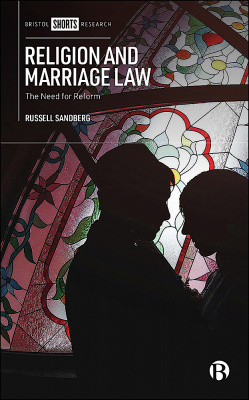
Could Cohabitation Rights Solve the Issue of Unregistered Religious Marriages?
A Contextualizing and Summary of
Religion and Marriage Law: The Need for Reform
Russell Sandberg
In my new book, Religion and Marriage Law: The Need for Reform, I argue that the law relating to marriage in England and Wales is outdated and leads to unfairness. There are now several forms of relationship that exist outside the legal framework. Three (overlapping) forms of relationship are now commonplace and exist the shadow of the formal law on intimate adult relationship:
The first and most common relationship type outside the legal framework are cohabiting partners. Office of National Statistics figures from 2013 show that the proportion of non-married women aged 18 to 49 who were cohabiting increased from one in ten in 1979 to over a third in 2011. Moreover, many of these couples wrongly think that they have “common law marriage” rights. The British Social Attitudes Survey conducted in 2018 showed that almost half those surveyed explicitly agreed with the erroneous statement that “couples who live together for a period of time have a common law marriage which gives them the same rights as married couples.” Yet, there are no cohabitation rights on relationship breakdown under English law. Other than where there are children as a result of the relationship or where the couple have been renting, if a cohabiting relationship breaks down, then any financial and property disputes are dealt with through the law of property which focuses on the question of ownership rather than fairness.
The second group are those who have what may be styled as “non-religious marriages”: those ceremonies that are conducted by belief organizations such as Humanists UK or by independent celebrants. Marriage law currently provides no means by which these can be legally binding in their own right. It is likely that COVID restrictions and the resultant backlog has increased the number of such weddings and has meant that many couples have not been able to book their additional civil ceremony with the registrar. However, these ceremonies are also not currently legally binding. Unless and until such couples also undergo a civil wedding ceremony under the Marriage Act 1949, they have the same legal status as cohabiting partners. Aside from the cost of undergoing a separate ceremony, there is the question of choice: who, after all, refers to their wedding as the happiest days of their life?

The third and final category can be referred to “unregistered religious marriages”: these exist where the couple undergo a religious ceremony that does not comply with the Marriage Act 1949. Religious marriages are recognized under the Act but in relation to religious weddings other than Church of England, Church in Wales, Quaker, and Jewish ceremonies, the ceremony must take place in a registered place of religious worship in order to be legally binding. Otherwise, though the couple are married in the eyes of their faith, they are not married in the eyes of the law. There are several reasons why couples might have unregistered religious marriages: it may be the choice of the parties (in some communities, religious marriages effectively allow the couple to date, to be together without a chaperone); it may be because the parties are unsure of the law; or it may be because it is difficult or impossible for a religious ceremony reflecting their beliefs to be held in a way that is compatible with marriage law requirements, because the religion does not have a building or has a tradition of marriages taking place outside places of worship.
These three forms of relationship underscore how the law on formalized relationships has failed to keep up with the changing social realities of adult intimate relationships in the twenty-first century. Religion and Marriage Law closely examines debates concerning how non-religious marriages and unregistered religious marriages sit outside the law. The existence of these unrecognized marriages is problematic: such couples lack legal redress if their relationships break down, putting them in the same position as cohabiting couples.
In particular, there are two main defects with the current law. First, the law currently creates an arbitrary threshold in regulating where marriages can take place. This discriminates against non-religious beliefs as well as those religions that either do not have places of religious worship or have a tradition of marriage outside of those buildings.
Second, particular problems arise when cohabitation status has been an unwitting decision by one or more of the parties. This might be because they are unaware of the legal requirements and believe themselves to be married, or it might result from delaying to formalize the relationship by one or both parties. When there has not been a voluntary decision by both parties to enter into a “non-religious marriage,” an “unregistered religious marriage,” or any other cohabitation relationship, it is problematic that these pairings would then receive no legal rights or remedies on separation. Many couples entering into these forms of relationship expect that they will have the same rights as those who are married or in civil partnerships, only to discover that, if their relationships fall apart, they cannot rely on the State. These couples are then forced to either resolve any disputes themselves or to use a form of dispute resolution. In relation to the breakdown of unregistered religious marriages, sharia councils and other forms of religious adjudication no longer represent forms of alternative dispute resolution. Instead, they become the only option.
As I argue in the book, these two defects point towards two different solutions: the first problem points to the need to reform the law on getting married; the second highlights the need to explore cohabitation rights upon separation.
The book explores the current legal framework on both opposite sex and same sex marriage and how each interacts with religion. It also examines proposals for reform put forward by the Law Commission. In the book, I agree with the Law Commission that we need to move away from a system that regulates buildings towards one that would regulate officiants. The Law Commission proposes that the following could be officiants: registration officers; Anglican clergy; nominated officiants from any religion or belief body; and independent officiants who apply directly to the General Register Office or Registrar General.
The Law Commission advises that religious and belief organizations should also meet three further requirements: they would need to have at least 20 members who meet regularly; the organization should have “a wedding service or a sincerely held belief about marriage”; and there would be a need to consider “whether there should be an express exclusion preventing organisations from nominating officiants if the organisation promotes purposes that are unlawful or contrary to public policy or morality.” These tests would not apply to independent celebrants.
However, if independent celebrants are able to go straight to the General Register Office, then it could be asked: Why should religion or belief officiants be denied that opportunity and be required to operate through their organization, and so be subject to further regulation concerning their organization rather than themselves? To put it another way, why should a religious leader of a faith of just nineteen members be denied the right to solemnize marriages, while an independent celebrant who represents just themselves has that power?
If ceremonies by independent celebrants are made legally binding (and there is no reason why they should not be), then there is no reason to restrict the organizations who can conduct weddings to religious or belief organizations. My book argues that all organizations should be able to nominate officiants – not just religion or belief organizations. This would avoid the vexed questions of how to define religion and how to define belief. It would also mean that most independent celebrants could be nominated as officiants through the umbrella organizations of which they are members, rather than through individually applying for officiant status, which would put pressure on the General Register Office or Registrar General.
Reforms to the law on getting married would therefore solve the concerns around non-religious marriages and would lessen concerns about unregistered religious marriages, since the discriminatory requirements that prevent some religious weddings from complying with the law (the need for the ceremony to occur in a place of worship) would be removed. However, there would still be some unregistered religious marriages – and some of these would not result from a voluntary and witting choice by both parties. The introduction of limited cohabitation rights on separation would deal with this.
We need a reformed law on getting married, and we also need to introduce cohabitation rights on separation.
Cohabitation rights upon relationship breakdown would provide a remedy to those who are in unregistered religious marriages where the decision not to enter into a legal marriage has not been entered into voluntarily, or where the relationship has changed over time so that one party has become reliant on the other or have suffered a detriment as a result of the relationship. This would apply, for instance, where one party has given up paid work, reduced their hours, or forgone promotion in order to raise children, to keep the home, and/or to look after the other party. These detriments are likely to be gendered and can often be subtle.
However, it is also important not to take an overly paternalistic approach. If the parties have made an autonomous choice not to marry, then this should be respected. The lead of other jurisdictions should be followed to allow couples to opt out of such cohabitation-based protection while also ensuring that this is voluntary and fair. This opt out rather than opt in requirement would ensure that cohabitation rights are afforded to couples who are choosing to cohabit thinking that they will accrue marriage-like legal rights, as well as those where there is an intention to marry but the couple does not get around to it (such as the couple in Her Majesty’s Attorney General v Akhter [2020] EWCA Civ 122).
Although no such system of cohabitation rights on separation currently exists under English law, my book points out that there are a number of precedents that can be used to develop such a scheme. These include the Scottish system, which is currently being reviewed by the Scottish Law Commission; the Irish system; a Law Commission report that is almost fifteen years old (Law Commission, Cohabitation: The Financial Consequences of Relationship Breakdown (Law Com No 307, 2007)); and two private Member’s bills that have been discussed in Parliament but have not become law: namely, Lord Lester’s Cohabitation Bill in 2009 and Lord Marks’ Cohabitation Rights Bill, which was first introduced in 2013 and mostly recently reintroduced in February 2020.
From these precedents, three main characteristics of a scheme providing for cohabitation law rights on separation can be distilled into three parts.
First, the statutory scheme will apply to cohabitants on separation provided that they have not opted-out. Most approaches provide for an opt-out either implicitly or explicitly. As the Law Commission argues: “If we want to remove more couples from the scope of property and trust law and the unsatisfactory outcomes that it often produces on separation, and thereby provide better basic justice between cohabitants, then an opt-in approach is not the answer” (para 2.86). The Law Commission and the private Members bills explicitly provide for opt-out agreements and stipulate what this should contain: the agreement needs to follow legal advice, be in writing, signed and witnessed – and proformas would be made available to enable these requirements to be laid out and met.
The Law Commission reasoned that a religious marriage agreement, such as a Nikah contract, “would only constitute an opt-out agreement if it indicated an intention to disapply the statute” (para 5.67). Provision would also be made for the parties to vary or revoke the agreement and for an agreement to be disapplied by the courts where it is manifestly unfair, taking into account the circumstances at the time the agreement was made; and, at separation, taking into account changes in circumstances between these dates.
Reforms to the law on getting married would therefore solve the concerns around non-religious marriages and would lessen concerns about unregistered religious marriages.
Second, the scheme would apply if the couple had been cohabitants and this would be understood as having a child together or living together for a certain amount of time. Some of the different approaches provide more details as to the definition of the term cohabitants than others. The less detailed definitions, however, are often then supported by a list of criteria to be taken into account in determining cohabitant status. In the Scottish model, this includes the period in which they have lived together, the nature of their relationship during that period, and the nature and extent of any financial arrangements subsisting, or which subsisted, during that period. This is one of the matters that the Scottish Law Commission is currently looking at, and their findings should also inform reform in England and Wales.
The Law Commission in England and Wales and the private Members bills suggest that the test ought to be either that the couple has lived together for a specified number of years or has had a child together. This would seem to be the appropriate threshold. As the Law Commission notes: “No jurisdiction which has legislated in this field has confined remedies to cohabitants with children”; and, there is “evidence that cohabitants without children have the same potential to encounter unfairness on separation as cohabitants with children” (paras 2.81, 2.77).
Third, the scheme would allow a cohabitant to seek a financial order on separation if certain circumstances are met. The broadest approach to this can be found in Lord Lester’s Cohabitation Bill, which simply stated that an order can be made if, “having regard to all the circumstances, the court considers that it is just and equitable to make an order.” Most approaches, however, require evidence of an advantage or disadvantage. This evidence is usually economic. Under the Law Commission’s proposals, financial relief would only be granted to the cohabitant “based upon the economic impact of cohabitation,” and only where “the respondent has a retained benefit; or the applicant has an economic disadvantage as a result of qualifying contributions the applicant has made” (paras 4.32, 4.33). The proposals further stated that the welfare of any children of both parties will be “the court’s first consideration,” but that a range of other factors, including the finances of both parties and their conduct, is also considered (para 4.38). It would be vital that the non-financial contributions of both parties are considered and that the court considers the changing circumstances of the relationship over time.
The important point –indeed, the main message of my book — is that both of these reforms are crucial. We need a reformed law on getting married, and we also need to introduce cohabitation rights on separation. Reform of either of these areas of law in isolation would not solve the concerns caused by the three forms of relationship that currently exist in the shadow of the law with the effect that the couple are denied legal rights. This is particularly problematic where this is not the result of a voluntary choice by one or both of the parties.
Reform of the law on getting married can resolve the issue of non-religious marriages and can mitigate the problem of unregistered religious marriages, but it would do nothing for cohabiting couples. Reform of the law on cohabitation, on the other hand, could be expected to resolve the issue for cohabiting couples and would provide some redress for those in non-religious or unregistered religious marriages, but it would not recognize their relationships as such.
Both reforms are therefore necessary, and there is a need for the Law Commission to build upon its previous work to form these reforms into a new modernized, accessible, and easily understandable legal framework that reflects the social reality of adult relationships in the twenty-first century. ♦

Russell Sandberg is Professor of Law at Cardiff University in the UK. His research interrogates the interaction between law and the humanities with a particular focus on legal history and law and religion.
Recommended Citation
Sandberg, Russell. “Could Cohabitation Rights Solve the Issue of Unregistered Religious Marriages?” Canopy Forum, July 28, 2021. https://canopyforum.org/2021/07/28/could-cohabitation-rights-solve-the-issue-of-unregistered-religious-marriages/


